Understanding the Process
The real estate world can seem pretty complicated. It’s a competitive market, and to shine, real estate agents need to be sharp and skilled, especially when it comes to helping people buy or sell homes. If you’re an agent, truly understanding the real estate process isn’t just helpful, it’s vital. It’s how you build great relationships with clients and make sure their needs are met, every single time.
A thriving real estate business isn’t just about closing deals; it’s about building lasting connections.
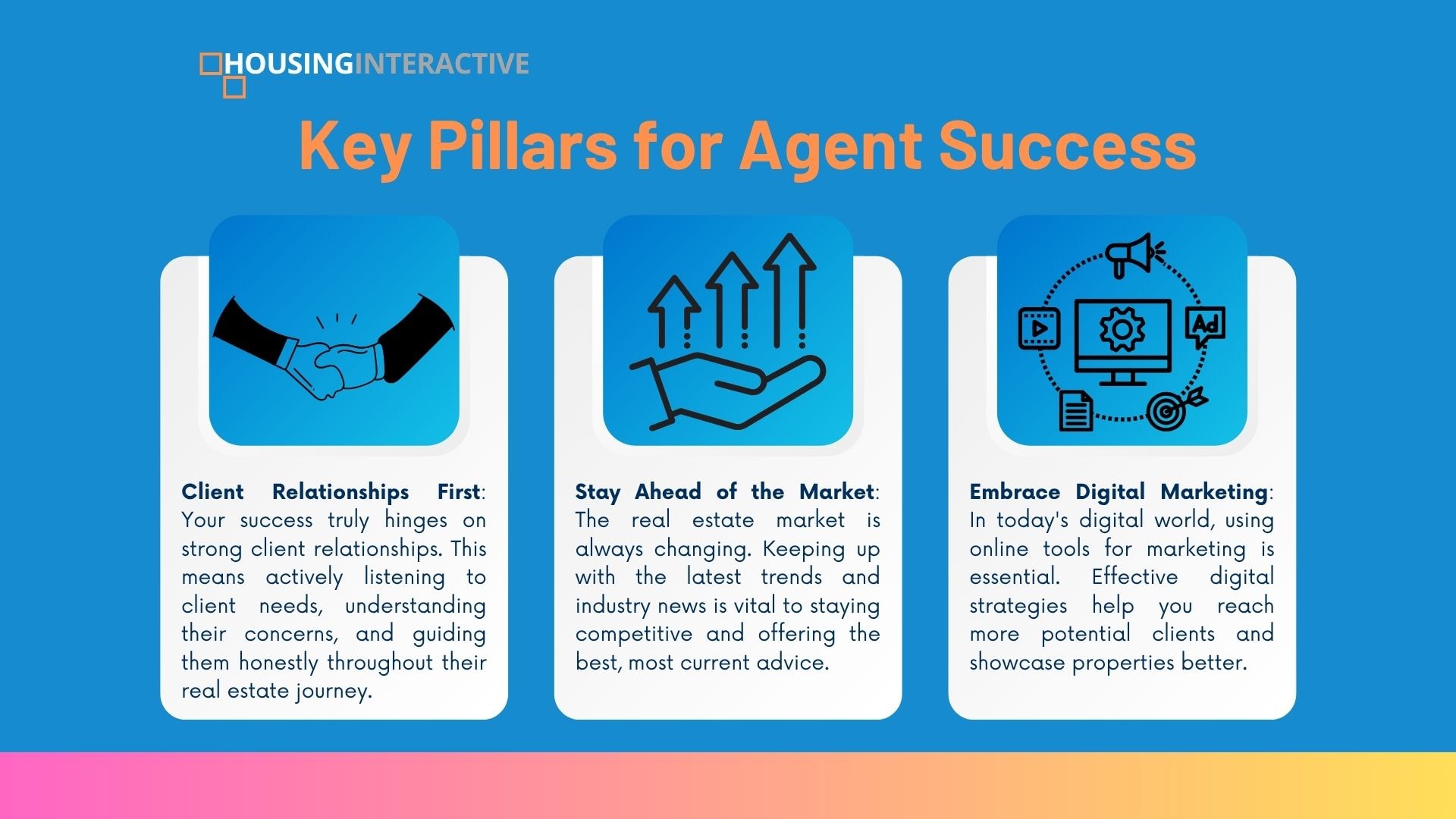
- Client Relationships Come First: Your success hinges on having strong relationships with your prospective clients. This means understanding what they’re looking for, listening to their concerns, and guiding them honestly.
- Stay Ahead with Market Trends: The real estate market is always changing. Keeping up with the latest trends and industry events, and news is key to staying competitive. You need to know what’s happening so you can give the best advice.
- Embrace Digital Marketing: In today’s world, using digital tools for marketing isn’t optional—it’s essential. Effective online strategies help you reach more potential prospective clients and showcase properties better.
Standing Out in a Crowded Market
To be the agent clients choose, you need to offer more than just listings:
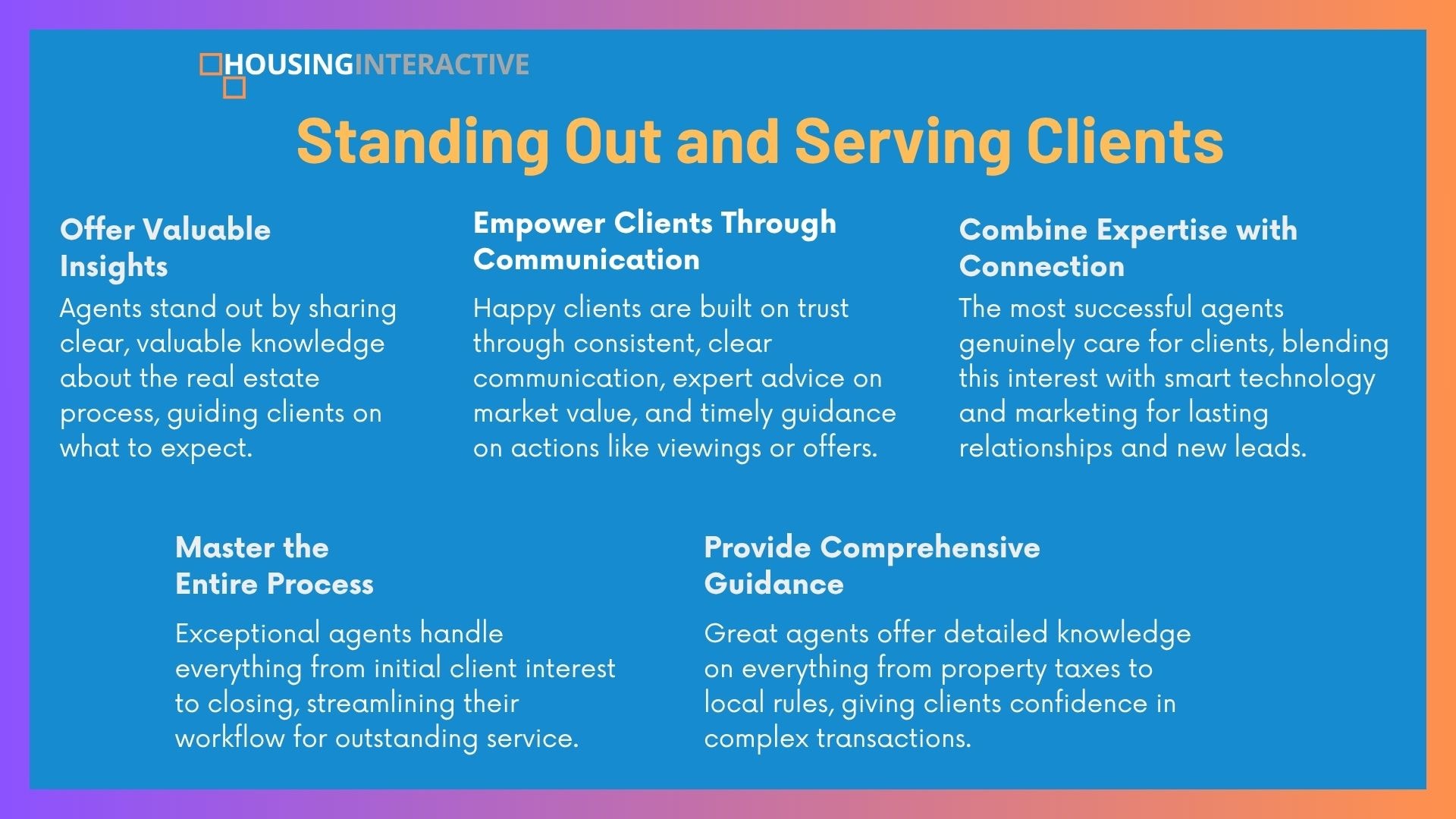
- Offer Valuable Insights: When connecting with clients, share valuable insights about the real estate process itself. Explain how things work, what to expect, and how you’ll guide them. This demonstrates knowledge and helps you stand out from multiple agents who just focus on closing a sale.
- Master the Entire Process: From a client’s first inquiry to the final closing, agents handle many tasks. Mastering the entire real estate sales process streamlines your workflow, from generating leads to managing communications and handling paperwork, allowing you to provide truly exceptional service.
- Empower Clients Through Communication: Happy clients are the backbone of a successful business. Foster trust by keeping clients informed and maintaining clear communication. This builds trust and encourages repeat business. A knowledgeable advisor who understands market value and property management can provide better advice on pricing and maintenance. In a competitive real estate market, gently encouraging clients to take timely action for viewings or offers is crucial.
- Provide Comprehensive Guidance: Being a great agent means knowing all the relevant details, including property taxes, local regulations, and community rules. This comprehensive guidance helps clients navigate complex transactions with confidence.
- Combine Expertise with Connection: The most successful agents genuinely care about their clients. Combining this genuine interest with smart use of technology and effective marketing creates a powerful formula for building strong client retention and generating leads for long-term success.
Step 1: Inquiry & Preparation
Understanding the Local Market. You’ve decided to sell your home—that’s a big step! But before you hang that “For Sale” sign, there’s crucial work to do. This phase, often called pre-sales preparation, is all about setting your property listing up for success. It involves getting your home ready, understanding the market, and creating a buzz to attract the right buyer.

A. For Buyers: What’s Your Motivation?
Every real estate journey kicks off with a personal reason.
- Define Your “Why”: Why do you want to buy a home? Are you a first-time homebuyer excited about your own space? Maybe you’re relocating for a new job, or looking to invest in a growing market like Iloilo or Davao. Your reason will shape your real estate journey and help guide your choices.
- Dream vs. Reality: Your “Must-Haves”: It’s time to get specific. What are your must-haves for a home? This could be a specific location, a certain number of bedrooms, or a backyard. Then, list your nice-to-haves, like a gourmet kitchen or a swimming pool. Being clear about these helps streamline your property search and keeps you focused.
- Assess Your Financial Readiness: This is super important. How much can you truly afford? Don’t just think about the mortgage payment. Remember to budget for property taxes, homeowners’ insurance, and potential homeowners’ association (HOA) fees. Using an affordability calculator early on can give you a clear financial picture.
B. For Sellers: Why Are You Selling?
Sellers also begin their real estate journey with a clear motivation.
- Understand Your Motivation and Timeline: Similar to buyers, knowing why you’re selling is key. Are you relocating, looking to upgrade to a larger home, or does a change in financial needs make selling necessary? Your timeline matters too: Do you need to sell quickly, or do you have the flexibility to wait for the best offer? This will influence your selling strategy.
- Initial Thoughts on Home Value: You probably have an idea of what your home is worth. While your real estate agent will conduct a detailed, data-driven analysis to pinpoint the optimal selling price, having a preliminary expectation can be a good starting point for discussions.
C. Working With a Real Estate Agent: Your Essential Guide
Navigating the real estate sales process independently is like sailing without a compass. A skilled real estate agent is your indispensable guide.
Here are key questions to ask prospective agents and why their answers matter:
| Key Questions to Ask Agents | Why It Matters |
|---|---|
| How long have you been in real estate? | Experience matters in negotiation and understanding local nuances. |
| What’s your area of specialization? | Local knowledge is crucial for accurate pricing and market insights. |
| Can I speak to past clients? | Social proof and testimonials build trust and confidence. |
For buyers, you’ll typically sign a Buyer Representation Agreement, which outlines your agent’s responsibilities to you. For sellers, a Listing Agreement formalizes the agent’s role in marketing and selling your property. These agreements clarify the terms of your professional relationship.
Your Agent’s Expertise
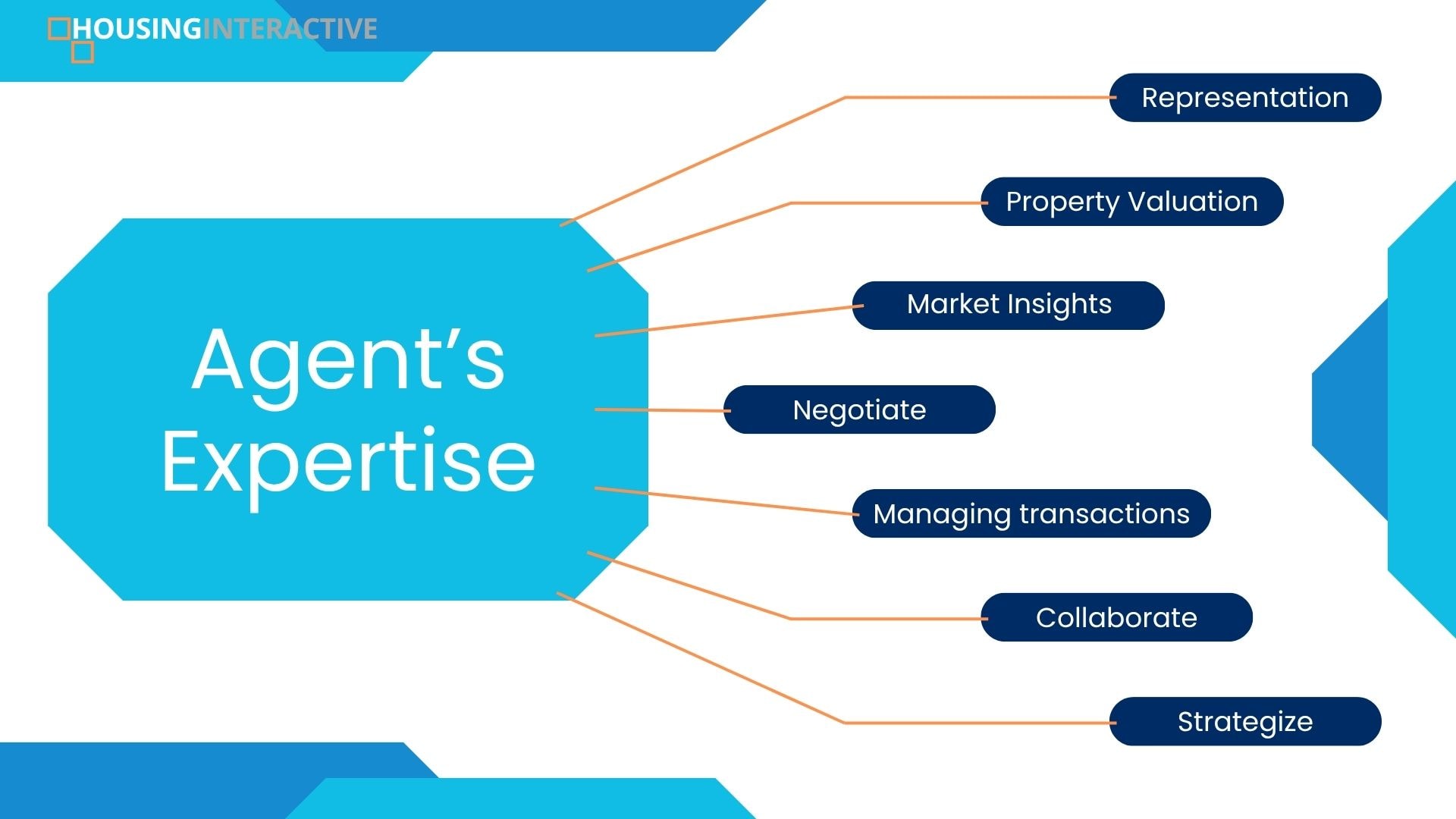
For a successful sale, your real estate agent has to be a local expert. They should have a deep understanding of the local real estate market. This isn’t just about knowing what homes are listed for; it’s about understanding:
- Current Market Trends: Is it a seller’s market (where homes sell fast and for more money) or a buyer’s market (where buyers have more power)? What are the average days on the market for similar properties right now?
- Property Values: What are homes like yours selling for in your neighborhood? Your agent will look at recent sales data, not just asking prices.
- Similar Properties (Comparables): What characteristics do other recently sold homes in your neighborhood possess? How do they compare to your property size, condition, and amenities? This helps in pricing your home correctly.
Your agent will essentially become a market researcher for your home, ensuring you’re making informed decisions.
Step 2: Financing & Property Preparation
Getting ready for action. This stage sets the foundation for your entire real estate process. Once you’ve set your intentions, it’s time to get down to business. This crucial stage of the real estate process involves getting your finances in order if you’re buying, and preparing your home to truly shine if you’re selling.
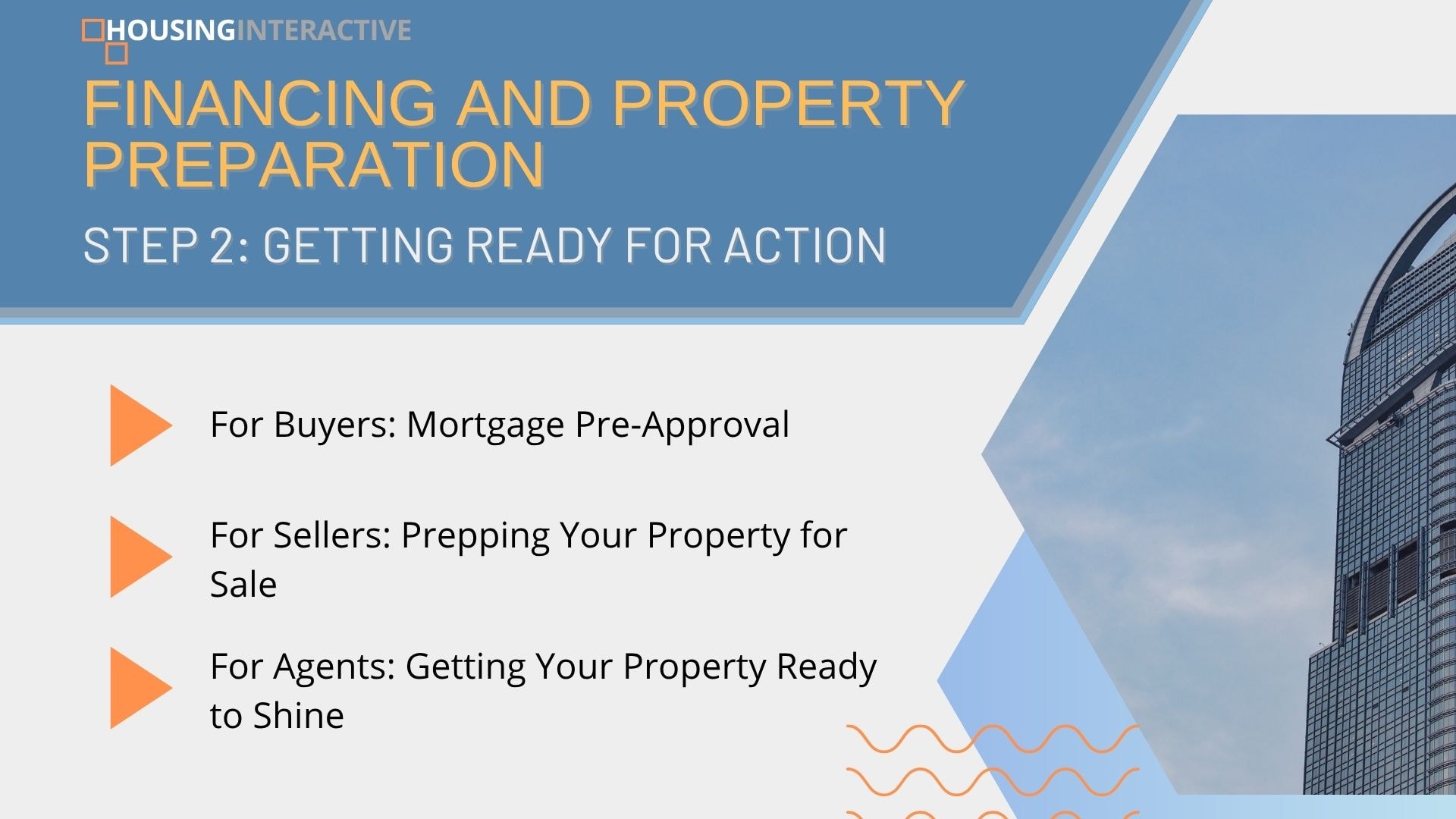
A. For Buyers: Mortgage Pre-Approval, Your Golden Ticket
Mortgage pre-approval is more than just a step; it’s a powerful tool in your home-buying process. It shows sellers you are a serious and qualified buyer, making your offers more attractive.
| Required Documents | Sample Documents | Why It’s Needed |
|---|---|---|
| Income Verification | Certificate of Compensation Payment or Income Tax Withheld | To calculate your borrowing capacity and stability. |
| Credit History | Credit Report from the Credit Information Corporation (CIC) | Impacts your interest rate and overall approval chances. |
| Asset Statements | Bank accounts, investment accounts | Confirms funds for down payment and reserves. |
- Understand the various loan types available in the Philippines, including:
- Bank Financing (Conventional Mortgage Loans)
- Government Housing Loans, such as Pag-IBig loans
- In-House Financing Options
- Private or Informal Loans
- Each loan type comes with its own eligibility criteria and unique benefits.
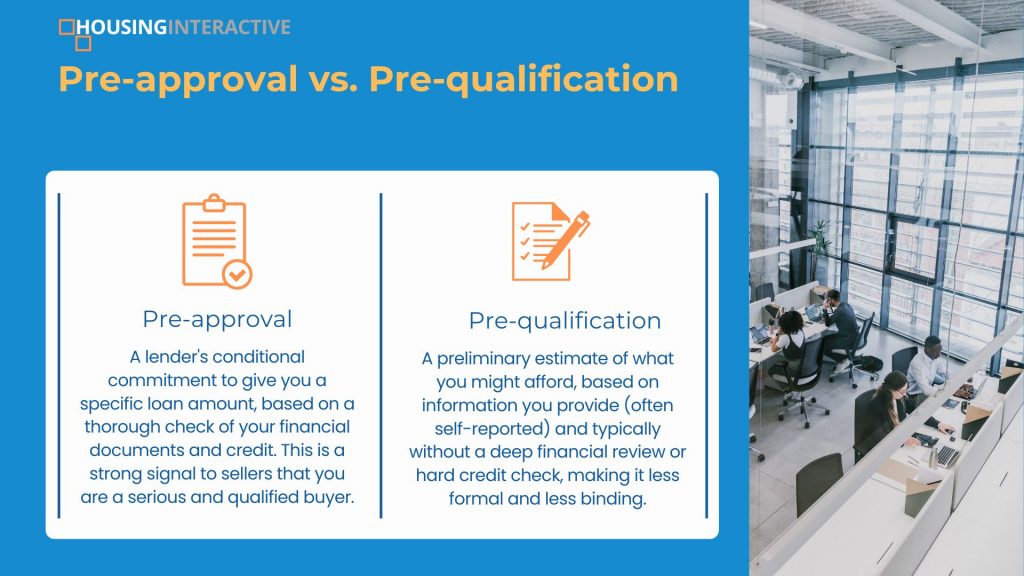
- Distinguish between pre-approval and pre-qualification:
- Pre-approval: It’s a conditional commitment from a lender to give you a loan up to a certain amount. They’ve checked your finances.
- Pre-qualification: An initial estimate of what you might afford, less formal and less binding.
- Prioritize obtaining pre-approval to strengthen your position during property negotiations and demonstrate serious intent to sellers.
B. For Sellers: Prepping Your Property for Sale
This is where you make your home shine. This stage is all about making your home as appealing as possible to potential buyers.
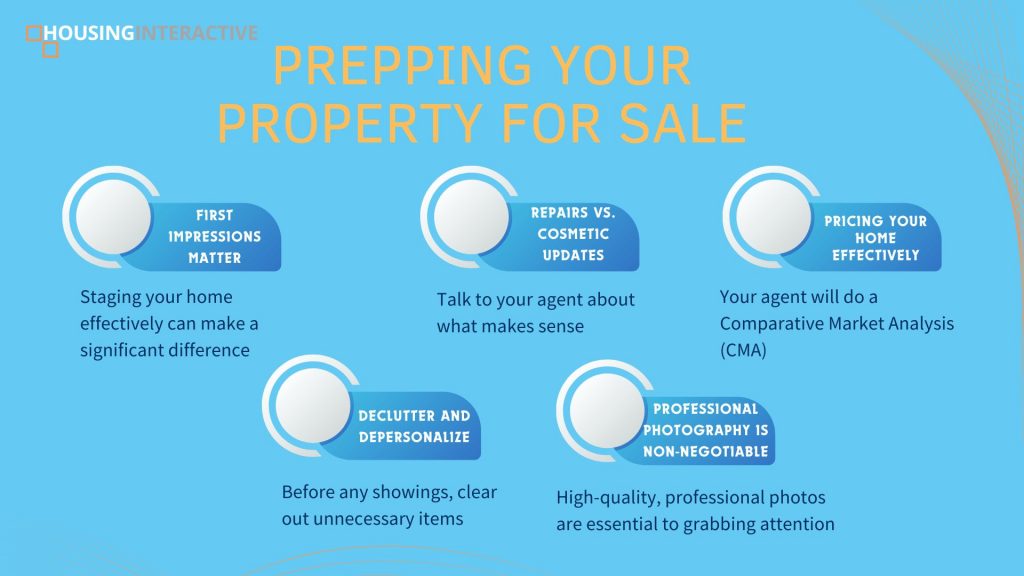
- First impressions matter: Staging your home effectively can make a significant difference. A clean, bright, and inviting space helps buyers visualize themselves living there. According to a 2023 National Association of Realtors (NAR) study, 83% of buyer’s agents agree that staging makes it easier for buyers to imagine a property as their future home.
- Declutter and Depersonalize: Before any showings, clear out unnecessary items. Remove personal photos, unique decor, and excessive furniture. The goal is to make the space feel open and neutral so buyers can easily imagine their life there.
- Professional Photography is Non-Negotiable: Most buyers start their search online. Blurry, dark phone pictures won’t cut it. High-quality, professional photos (and even virtual tours or drone shots for larger properties) are essential to grabbing attention and getting potential buyers excited to see your home in person.
- Pricing Your Home Effectively: Your agent will do a Comparative Market Analysis (CMA). This involves looking at homes similar to yours that have recently sold in your specific area. This data-driven approach helps determine the optimal listing price that attracts clients without leaving money on the table.
C. For Agents: Getting Your Property Ready to Shine
Once your agent understands the market, the focus shifts to your home. Preparing a sales listing involves a few key steps to make your property irresistible to potential buyers.
- Interviewing the Seller: This isn’t just a casual chat. Your agent will sit down with you to understand your goals for selling, your timeline, any special features of your home, and what you’re hoping for in the sale. This helps them tailor their strategy specifically for you and your property.
- Preparing the Property: This is where you transform your home from “yours” to “a potential buyer’s.” Think about decluttering, cleaning, and making any necessary repairs. Sometimes, staging (arranging furniture and decor to make spaces look their best) can make a huge difference. The goal is to make your home as appealing as possible to a wide range of people.
- Promoting It to Attract Potential Buyers: Your agent will then craft a marketing plan. This includes professional photos, detailed descriptions, and deciding where and how to advertise your home to reach the most interested buyers.
Smart Tools for Agents: Driving Your Sale Forward
Today’s real estate industry relies heavily on leveraging technology. Agents use smart tools to manage the selling process efficiently.
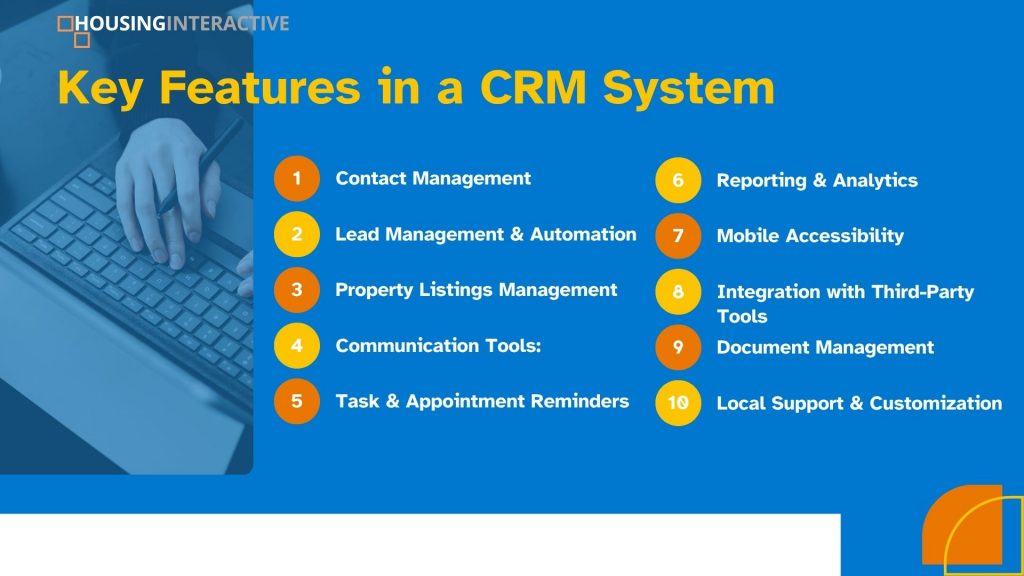
- CRM Systems (Customer Relationship Management): These systems help agents manage all client interactions. They track calls, emails, showings, and feedback, ensuring nothing falls through the cracks. This means your agent can provide excellent customer relationship management and keep you informed every step of the way.
- Digital Marketing Tools: From creating virtual tours to running targeted social media ads, these tools help your property get noticed by the right people. They allow agents to track who’s looking at your listing and how interested they are.
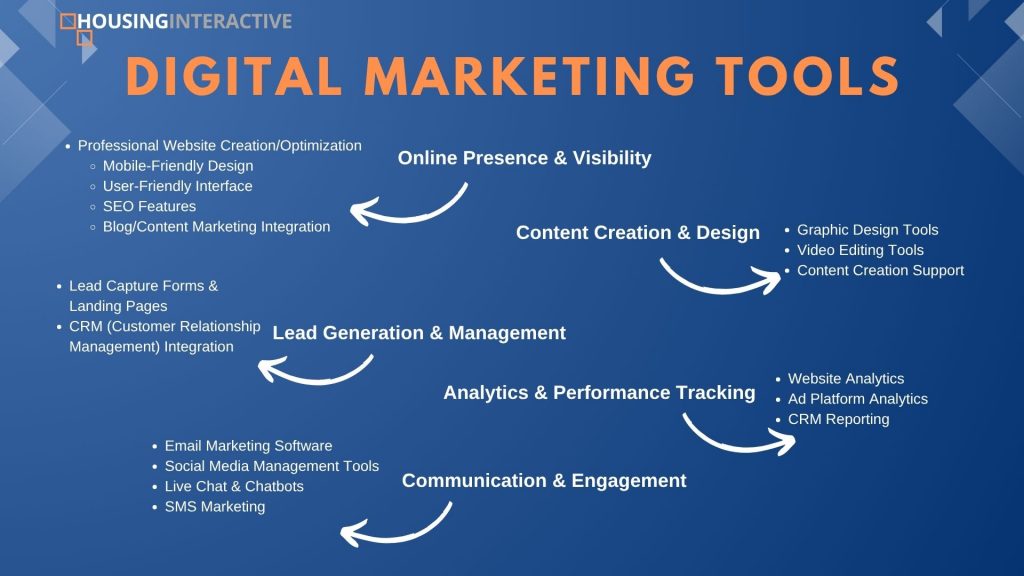
Setting the Right Price: Market Analysis is Key
Pricing your home correctly from the start is critical. Price it too high, and it might sit on the market. Price it too low, and you could miss out on money.
- Conducting Market Analysis and Researching Market Trends: Your agent will thoroughly analyze recent sales data (those “comparables” we talked about earlier). They’ll look at the current market conditions – for example, are homes selling above or below asking price? This research helps determine the optimal selling price for your property.
- Creating Effective Marketing Strategies: Knowing the market also helps agents craft the best way to present their home. If homes with certain features are selling fast, those features will be highlighted in the marketing materials.
Showcasing Your Property: Viewings and Open Houses
Once your property is ready and priced, it’s time to open the doors to potential buyers.
- Property Viewings: These are individual appointments where interested buyers and their agents can tour your home. Your agent will coordinate these to fit your schedule.
- Organizing Open Houses: These are scheduled periods where multiple potential buyers can visit your home without an appointment. Both viewings and open houses are designed to attract clients and showcase the property’s best features, allowing people to imagine themselves living there.
Pre-sales preparation sets the stage for a smooth and successful sale. It’s about being strategic, informed, and making sure your home stands out in the market.
Step 3: Property Promotion
The Search or The Sale – Property Hunt & Marketing. Once your property is perfectly prepared and priced, the next big step is to make sure everyone knows about it. This is where Property Promotion comes in. It’s all about getting your home in front of as many potential buyers as possible, using the best tools available today.
This is where the real estate process shifts from preparation to maintaining engagement.
A. Buyers: Searching Smart for Your Dream Home
Your agent will leverage powerful tools like Multiple Listing Service (MLS) access and their network to find homes, including potential pre-market listings.
When viewing homes, go beyond the aesthetics. Here are some home viewing tips and red flags to watch for:
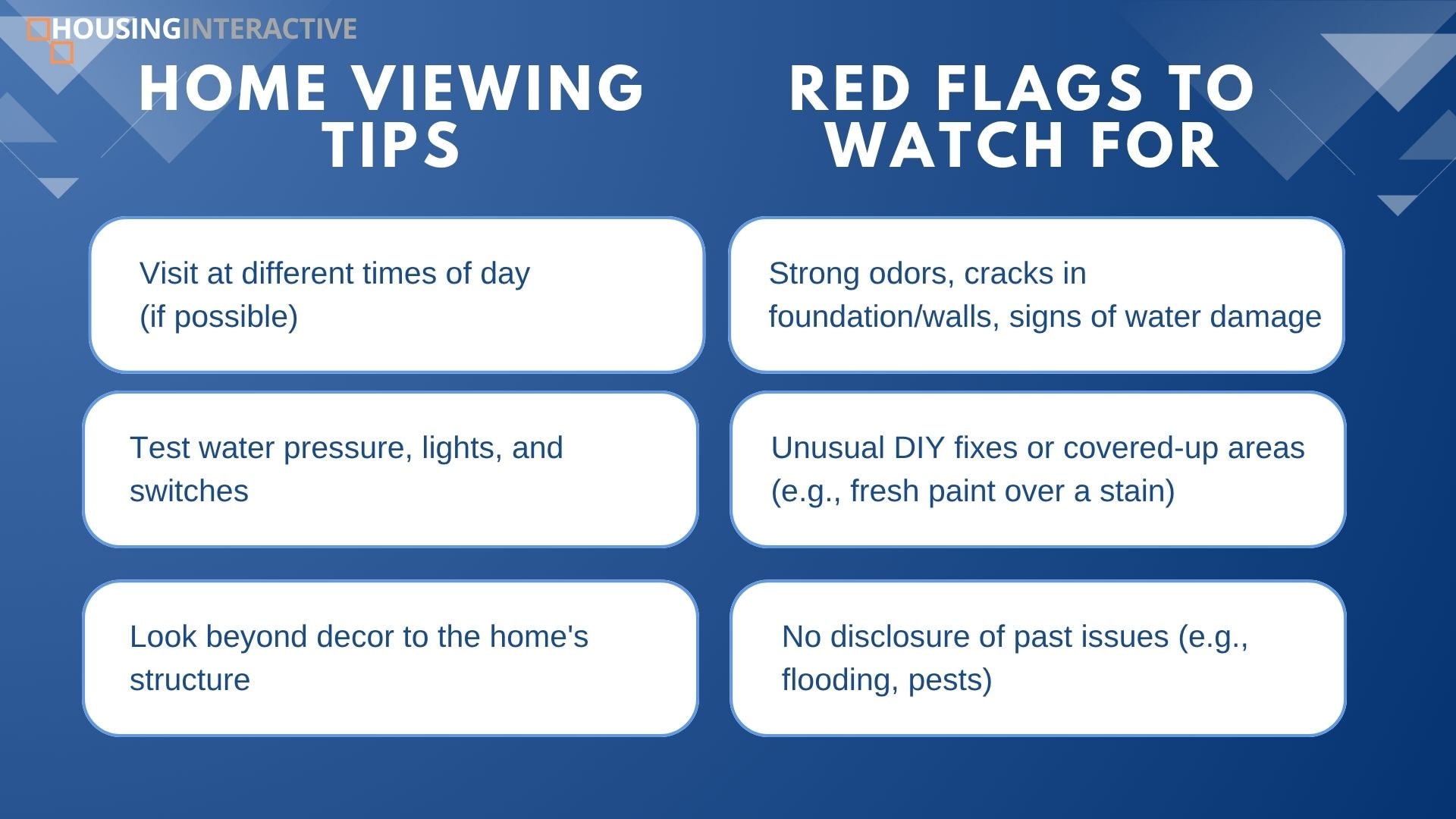
Be patient and flexible in your real estate journey. The perfect home might take time to find. Stay open to properties that meet your core needs, even if they don’t fulfill every single “nice-to-have”.
B. Sellers: Marketing Your Home to Attract Buyers
Your agent will deploy a comprehensive marketing strategy that could include 3D virtual tours, targeted social media campaigns, email newsletters, and traditional open houses.
Your listing description checklist should highlight unique features, recent upgrades, and the lifestyle benefits of living in your home and community.
When handling showings, ensure your home is clean, decluttered, and depersonalized. Secure valuables and make it easy for potential buyers to envision themselves living there. Finally, pay attention to feedback from showings. This valuable input can help you adjust your strategy if needed.
C. Agents: Reaching a Wider Audience by Spreading the Word
In today’s real estate world, simply putting a “For Sale” sign in the yard isn’t enough. To truly succeed, your agent needs to cast a wide net.
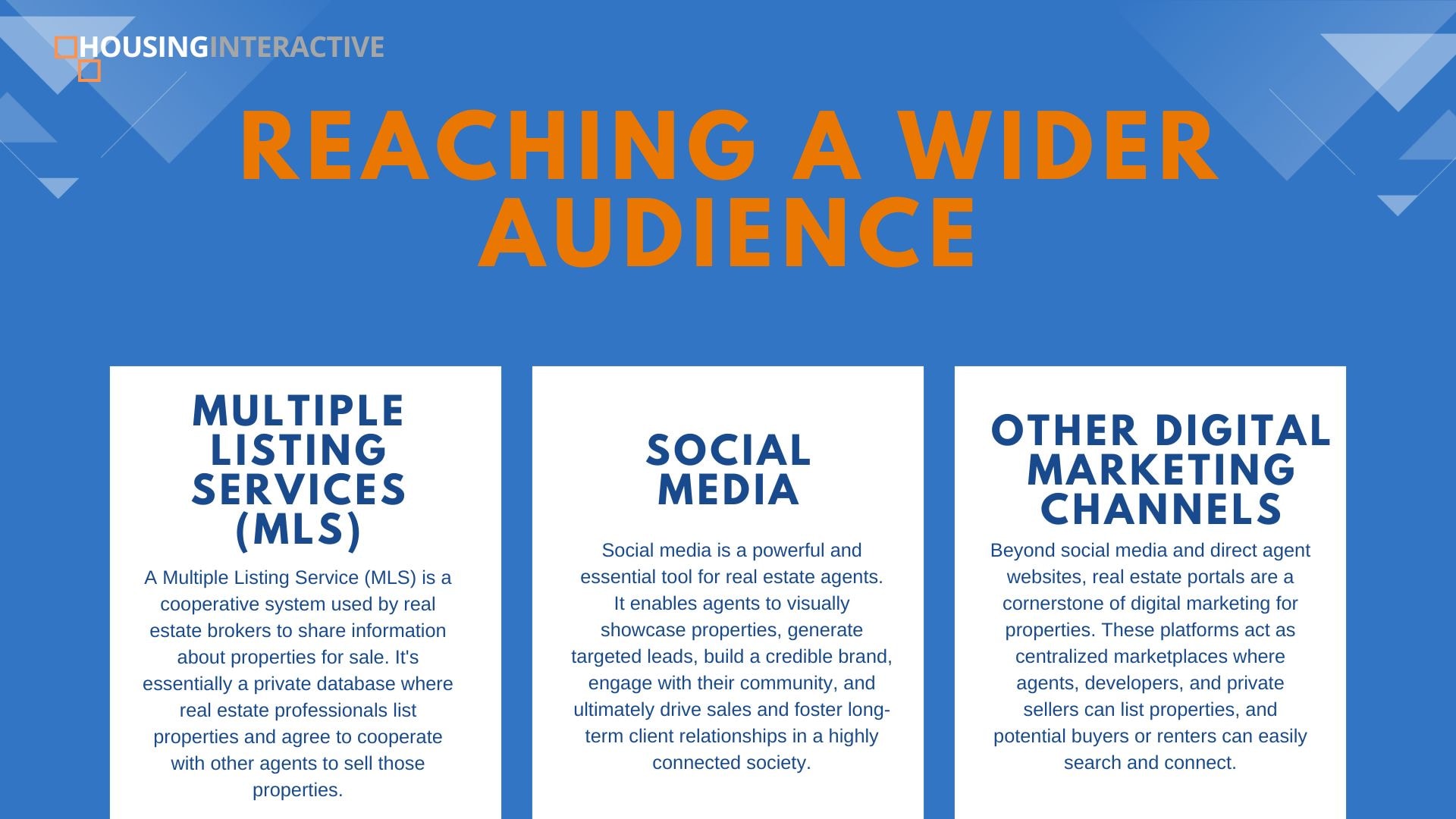
- Multiple Listing Services (MLS): This is the foundation. An MLS is a comprehensive database used by real estate professionals. When your property is listed on the MLS, it becomes visible to hundreds, if not thousands, of other real estate agents and their clients. It’s like having your home instantly advertised to a vast network of potential buyers.
- Social Media: Platforms like Facebook, Instagram, YouTube, and even TikTok are powerful tools. Your agent can create engaging posts, share stunning photos, and run targeted ads to reach people who might be looking for a home just like yours. This helps connect with a broader, more diverse audience, including those who might not be actively browsing traditional real estate sites yet.
- Other Digital Marketing Channels: This can include real estate portals (like Lamudi or Property24 in the Philippines), email newsletters sent to interested buyers, and even specialized real estate websites. The goal is to maximize visibility online, where most people start their home search today.
By combining broad reach, compelling visuals, direct experiences, market knowledge, and modern technology, effective property promotion ensures your home gets the attention it deserves and attracts the right buyer quickly.
Step 4: Sales and Negotiation
Offers, Negotiation & Acceptance. Once your property is attracting attention, the real estate process shifts to Sales and Negotiation. This is where initial interest turns into concrete offers, and skillful conversations lead to a successful deal. For real estate agents, this stage is all about understanding people, communicating clearly, and getting the best possible outcome for their clients.
A. Buyers: Crafting a Winning Offer
Your offer isn’t just about the price; it’s a comprehensive package.
| Offer Components | Description |
| Price | Based on the CMA and your budget, ideally competitive. |
| Contingencies | Crucial clauses like financing, inspection, and appraisal protect you. |
| Earnest Money | A deposit (typically 1–3% of the purchase price) showing serious intent. |
| Ideal Closing Date | Aim to align with the seller’s preferences if possible for a smoother property transaction timeline. |
In a competitive market, consider competitive offer tips: a personal letter to the seller, a slightly higher earnest money deposit, or waiving non-critical contingencies. Your agent’s negotiation skills are invaluable here. After submission, prepare for either acceptance, a counteroffer, or rejection.
B. Sellers: Reviewing & Choosing Offers
When offers come in, don’t just focus on the highest price. Evaluate the entire package: the buyer’s financing strength, the number and type of contingencies, and their proposed schedule for closing the sale on a home.
If you receive multiple offers, your agent will help you understand strategies like escalation clauses (where buyers automatically increase their offer if outbid) and setting response deadlines. Crafting strong counteroffers with your agent’s guidance is key to getting the best terms. Once you accept an offer, you officially move into the “under contract” phase of the real estate process.
C. Agents: Connecting with Clients, Building Trust and Understanding Needs
At the core of every successful real estate transaction is a strong relationship built on trust and understanding. For agents, this means more than just showing properties; it’s about deeply connecting with clients and guiding them through a significant life decision.
- Building Trust Through Understanding:
- It’s crucial to build rapport and truly understand client needs.
- For buyers, this means actively listening to their dreams, concerns, and budget for a new home in areas like Taguig City.
- For sellers, it’s about understanding their reasons for moving, their ideal timeline, and their financial goals.
- When clients feel truly understood, they are far more likely to trust your advice and cooperate effectively through what can be a stressful real estate journey.
- Converting Interest into Agreements:
- A key skill for agents is the agent’s ability to convert curious inquiries (leads) into signed contracts.
- This involves guiding potential clients through the entire process, answering their questions, and addressing any hesitations until they are ready to make or accept an offer.
- Success in this area requires persistence, responsiveness, and a deep understanding of both the property and the client’s motivations.
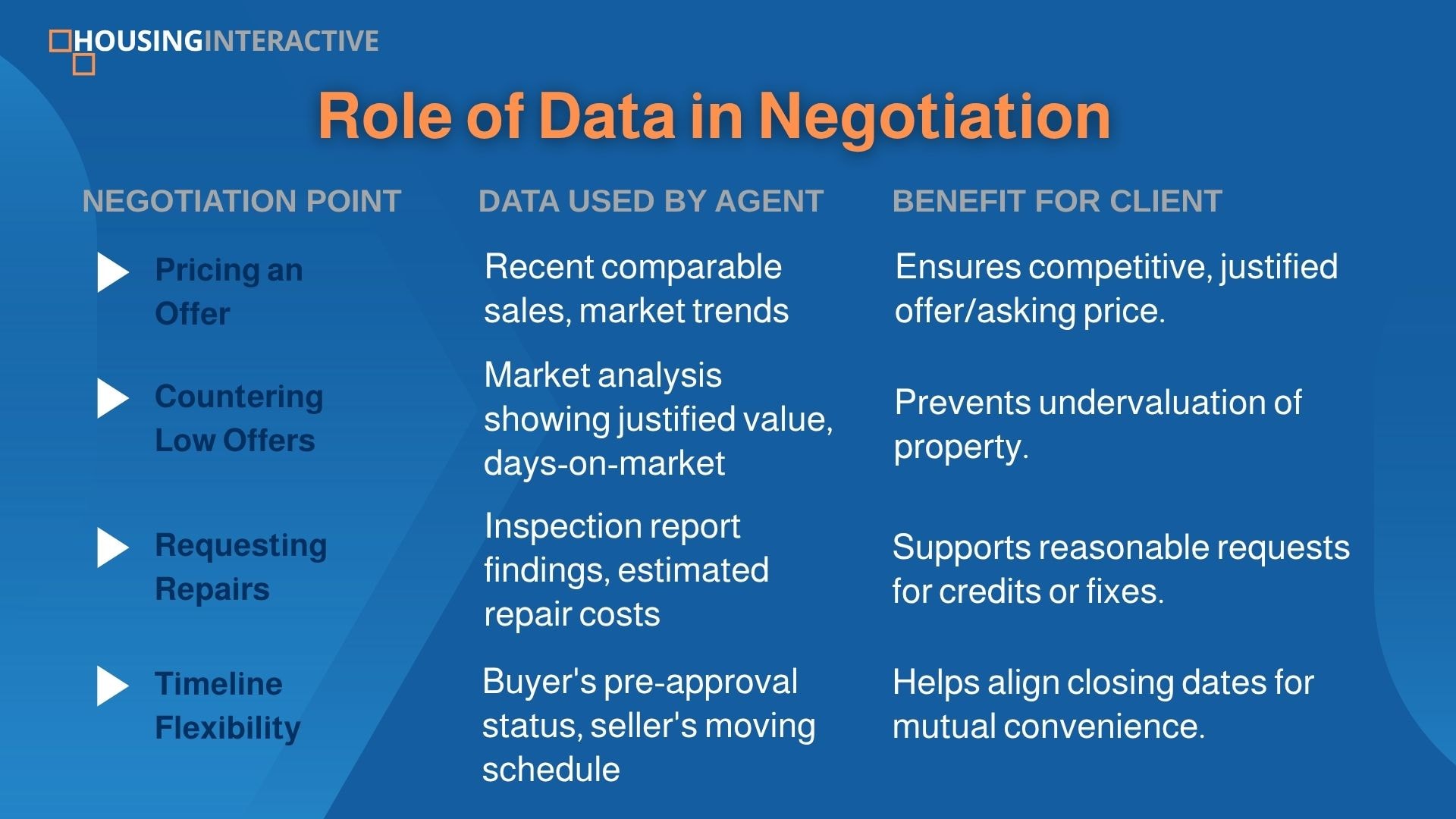
- Expert Advice and Data-Driven Decisions:
- Clients rely solely on their agents for expert advice beyond just paperwork.
- Providing valuable insights and market analysis helps clients make informed decisions and builds confidence in the agent’s expertise.
- For example, an agent might show a buyer recent sales data for similar homes in Taguig or explain local market trends to help them decide on an offer.
- Mastering Negotiation with Skill and Data:
- Negotiating the selling price and terms requires strong communication and interpersonal skills. It’s a back-and-forth process where agents act as a bridge between buyers and sellers, understanding priorities and finding common ground.
- Crucially, agents use data and market reports to support negotiations. This means leveraging recent comparable sales data, days-on-market statistics, and current market trends to justify pricing or counter-offers.
This stage of Sales and Negotiation combines all the previous preparation and market knowledge, guiding clients efficiently towards a successful home closing sale.
Step 5: Under Contract – Inspections, Appraisals & Approval
You’re under contract—congratulations! This is often the busiest phase of the real estate process, filled with due diligence.
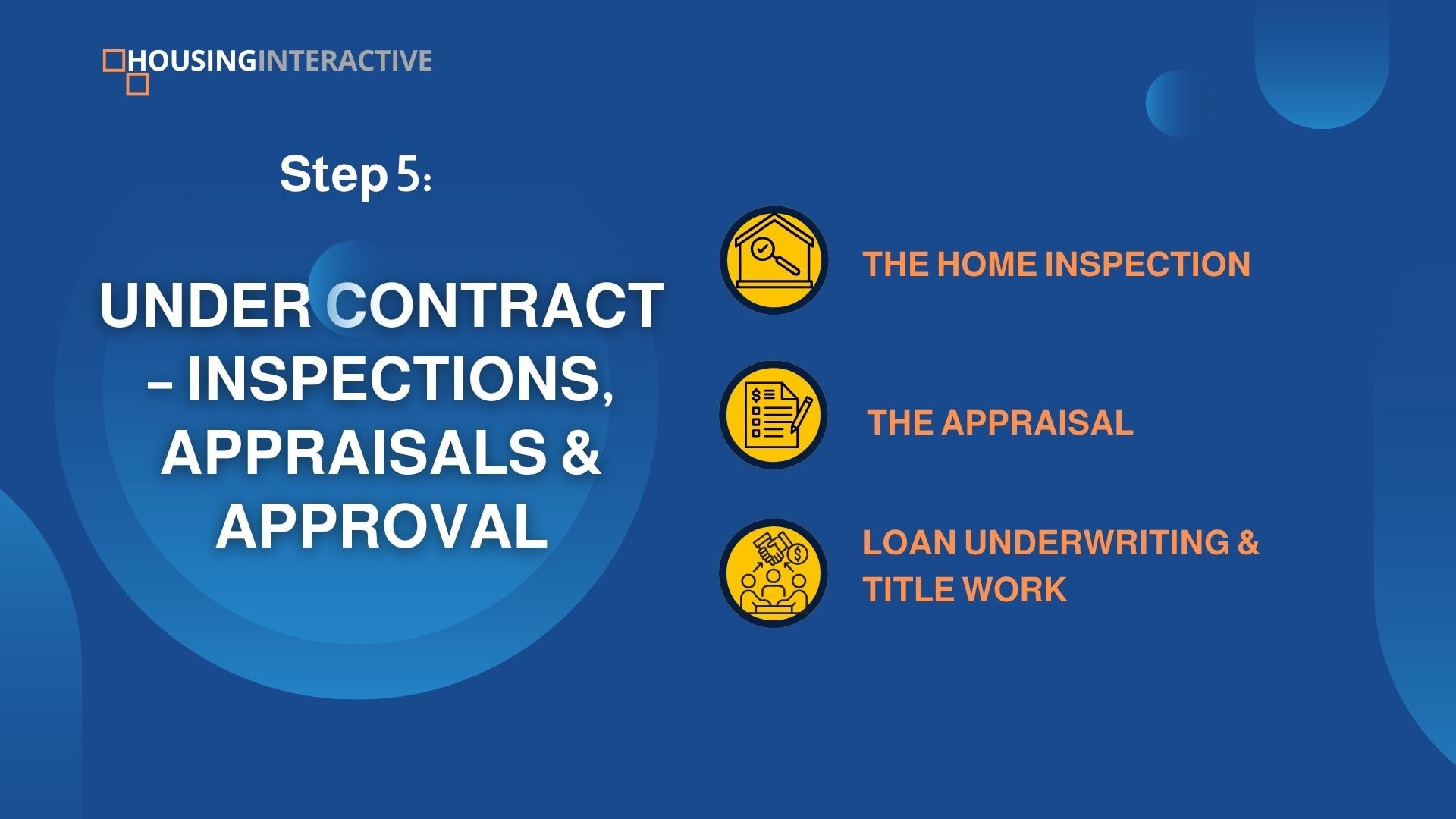
The Home Inspection
This is a crucial step for buyers. A professional home inspector will examine major systems and structures.
| What’s Covered | Why It Matters |
| Roof, HVAC, electrical, plumbing, foundation | Identify potential deal-breakers or points for negotiation on repairs. |
Review the inspection report carefully. You can then negotiate repairs or credits with the seller. Your agent will advise you on when to walk away versus when to renegotiate.
The Appraisal
A lender-hired third-party appraiser assesses the property’s value. This protects the lender by ensuring the loan amount doesn’t exceed the home’s market value. If the appraisal is low, you might need to renegotiate the price or increase your down payment.
Loan Underwriting & Title Work
For buyers, this is when your lender’s underwriting department thoroughly reviews your financial documents. Be responsive to any requests for additional relevant information. Crucially, avoid taking on new loans or changing jobs during this period, as it can jeopardize your final loan approval. The much-anticipated phrase is “Clear to Close“, meaning your loan is fully approved.
A title search confirms legal ownership of the property and uncovers any liens or encumbrances. Title insurance protects both you and the lender against undisclosed claims to the property.
Step 6: Closing the Sale
The Final Steps to Your New Home. You’ve found the perfect property, negotiated the terms, and made it through inspections and appraisals. Now comes the exciting final stage of the real estate process: Closing the Sale. This is the culmination of all your hard work, where ownership officially transfers and keys change hands. It’s a precise process that demands sharp attention to detail and clear communication from everyone involved.
A. Buyers: The Final Walkthrough
Typically, a day or two before the official closing, buyers will conduct a final walkthrough of the property. This is your last chance to inspect the home before it’s officially yours.
- What You’re Looking For:
- Agreed-Upon Condition: Is the property in the same condition as when you last saw it, or as agreed upon in the contract?
- Completed Repairs: Have all repairs been negotiated after the home inspection has been completed to your satisfaction?
- No New Damage: Has any new damage occurred since your last visit (e.g., burst pipes, broken windows)?
- Inclusions Present: Are all fixtures and appliances that were included in the sale (as per the contract) still present? (e.g., did the seller remove the specific curtains that were supposed to stay?)
- Property Cleared: Is the seller’s personal property moved out (unless otherwise agreed)?
- What to Do if Issues Arise: If you find anything amiss during the walkthrough, immediately notify your real estate agent. They will communicate with the seller’s agent to address the issue before the final signing. This is crucial to prevent last-minute surprises.
B. The Closing Appointment: Who Attends & What Happens
This is the big moment! The closing appointment is where all the legal and financial documents are signed, making the transfer of ownership official.
Who Attends (Key Players):
- Buyers: You, the person (or people) purchasing the property. You’ll sign the loan documents and the deed.
- Sellers: The person (or people) selling the property. You’ll sign the deed and transfer documents.
- Real Estate Agents: Both the buyer’s agent and the seller’s agent will typically be present to guide their respective clients, answer questions, and ensure a smooth process.
- Closing Agent / Attorney / Notary Public: In the Philippines, this is often handled by a notary public or a closing attorney representing the title company or lender. This person facilitates the signing of documents, explains their legal implications, ensures all legal requirements are met, and oversees the transfer of funds. They ensure the title is clear and recorded correctly.
- Lender Representative (Sometimes): While not always physically present, a representative from your bank or lending institution might be on call or present for final clarifications.
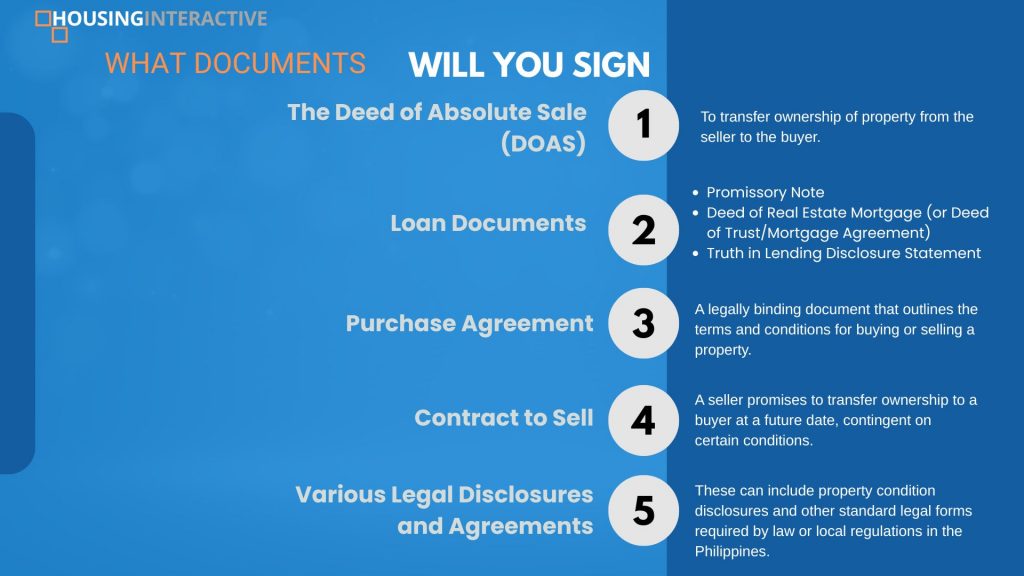
What Documents Will You Sign?
- The Deed of Absolute Sale (DOAS): This is the most critical document for sellers, transferring legal ownership of the property from the seller to the buyer. For buyers, it’s the document confirming your new ownership.
- Loan Documents (for Buyers): If you’re getting a mortgage, you’ll sign numerous documents related to your loan, including:
- Promissory Note: Your promise to repay the loan amount.
- Deed of Trust/Mortgage Agreement: Pledges the property as collateral for the loan.
- Truth in Lending Disclosure: Details the loan terms and costs.
- Various Legal Disclosures and Agreements: These can include purchase agreements, property condition disclosures, and other standard legal forms required by law or local regulations in the Philippines.
Funds Transfer: How to Pay (for Buyers):
For your down payment and closing costs, funds are typically transferred via wire transfer directly to the closing agent or title company. Occasionally, a cashier’s check might be accepted. Personal checks are generally not allowed for large sums on closing day. Your agent will confirm the exact method and recipient well in advance.
Receiving the Keys (for Buyers) or Funds (for Sellers)
Once all documents are signed, reviewed by the closing agent, and all funds have been verified as transferred, the deal is officially closed.
- Buyers: You will receive the keys to your new home, officially marking the transfer of possession!
- Sellers: The proceeds from the sale (minus your outstanding mortgage, if any, and closing costs) will be disbursed to you, usually via wire transfer to your bank account.
Congratulations! You’ve completed the real estate process. It’s a moment of great excitement and relief, the culmination of your entire real estate journey.
Step 7: Post-Closing Essentials
The real estate process doesn’t quite end at the closing table.
A. For Buyers: Settling In
- Set up utilities in your name (electricity, water, internet).
- Arrange for mail forwarding.
- Start creating a maintenance plan for your new home (e.g., roof inspections every 10 years, HVAC servicing every 15 years, pest control specific to areas).
B. For Sellers: Wrapping Up
- Cancel utilities and get final readings.
- Redirect mail to your new address.
- Keep thorough records for tax purposes.
- Stay in touch with your real estate agent—they can be a valuable resource for future opportunities or referrals.
C. Agents: Post-Sale Support and Client Retention
The moment the keys exchange hands or the funds clear isn’t the end of the real estate process for a great agent; it’s a new beginning for a lasting relationship.
- The connection with your agent doesn’t necessarily end at closing.
- Providing post-sale support and follow-up is key to ensuring client satisfaction and encouraging repeat business.
- A thoughtful agent might check in a few weeks after you’ve moved to see how you’re settling in or provide a list of local service providers, like movers or electricians in Makati. This shows they care beyond just the sale, building loyalty.
Conclusion: Your Successful Real Estate Journey
The real estate process can be complex, yes, but with the right guidance, it’s entirely manageable and incredibly rewarding.
Here’s a quick recap of your real estate journey:
| Stage | Key Milestone |
| Preparation | Define goals, choose an expert agent, and get pre-approved for financing. |
| Search/Market | Actively view homes or strategically list your property with compelling marketing. |
| Offer & Negotiate | Submit or receive offers, negotiate terms, and sign contracts. |
| Under Contract | Due diligence: Conduct inspections, complete appraisals, and secure loan underwriting. |
| Closing | Sign all legal and financial documents, transfer funds, and finalize the transaction. |
| Post-Close | Settle into your new home or manage the transition after selling. |
Understanding each step of the real estate journey puts you in control. You’ll be able to ask the right questions, anticipate challenges, and make confident decisions every step of the way.
Ready to start your real estate process? Whether you’re looking for your first home or ready to move on from your current one, contact HousingInteractive today! We’re here to guide you every step of the way and make the process simple, smooth, and successful.

























